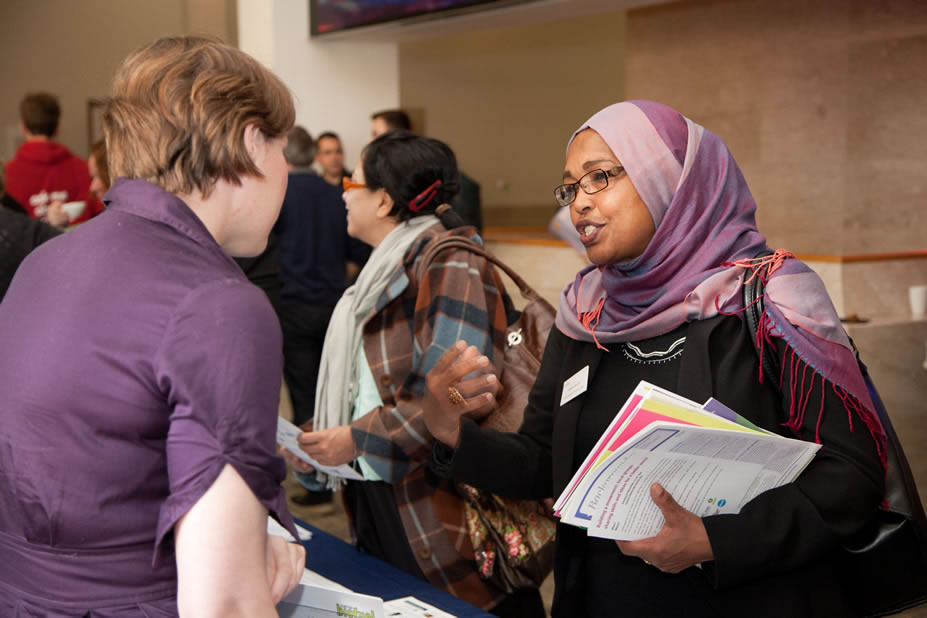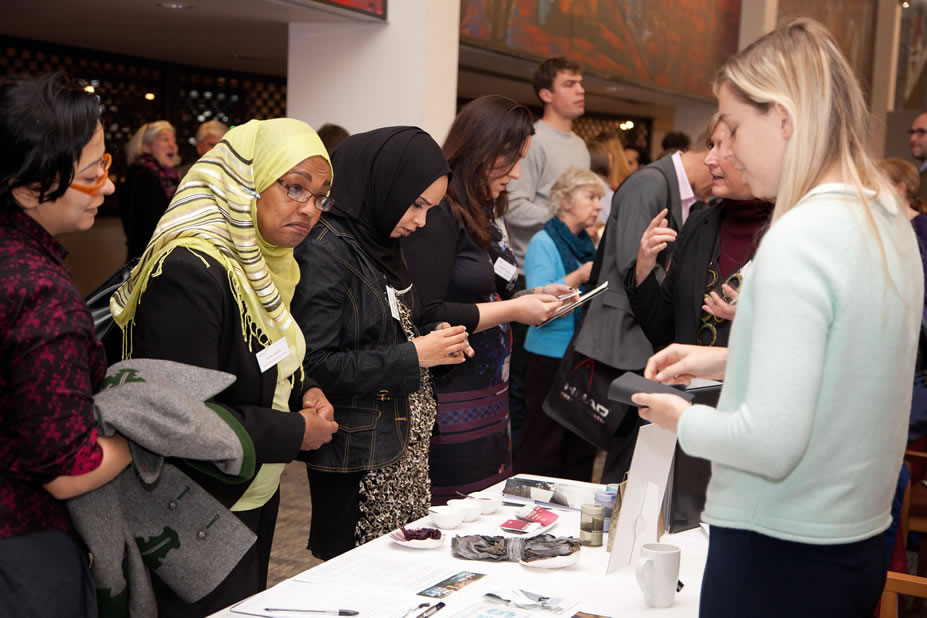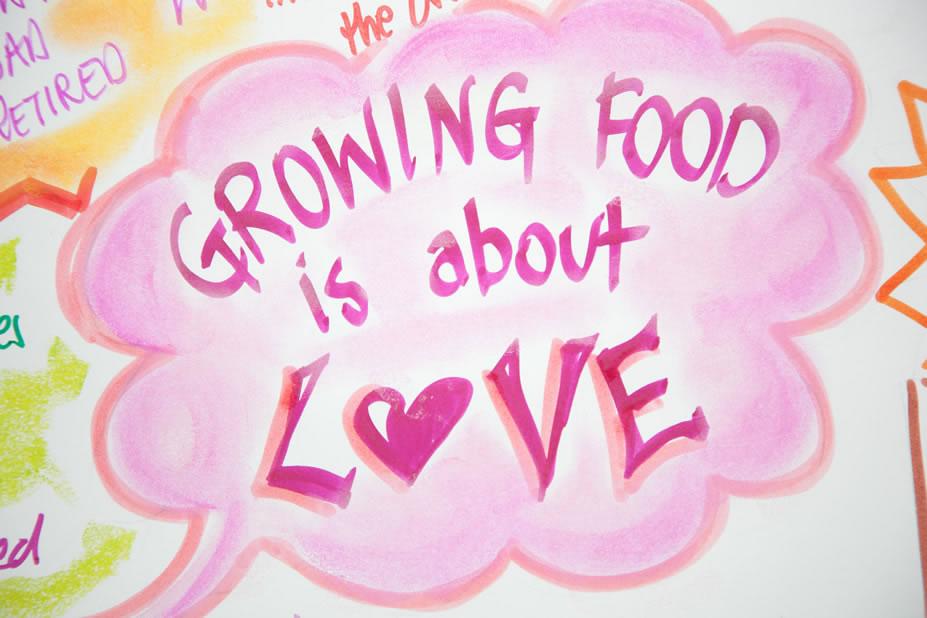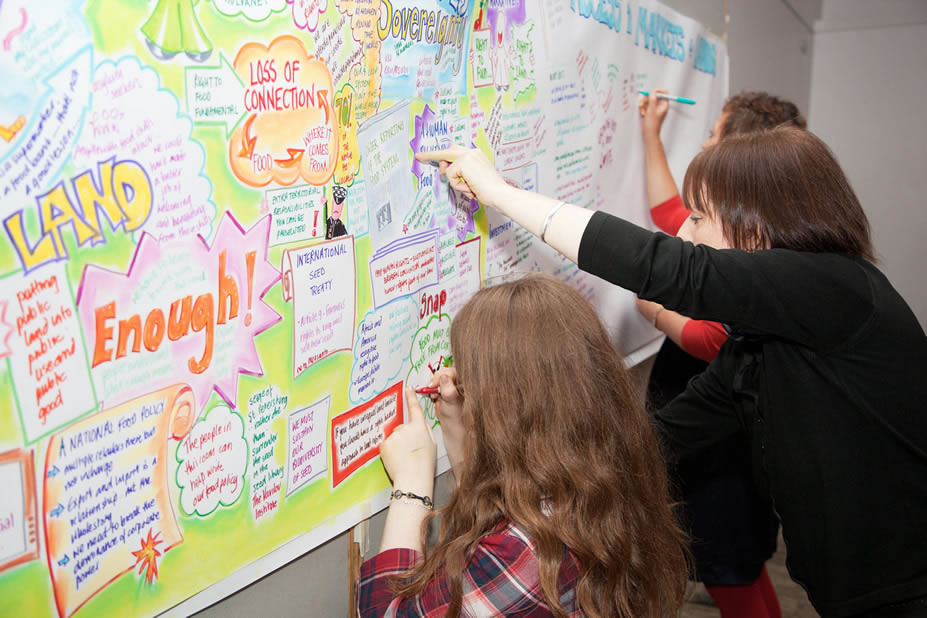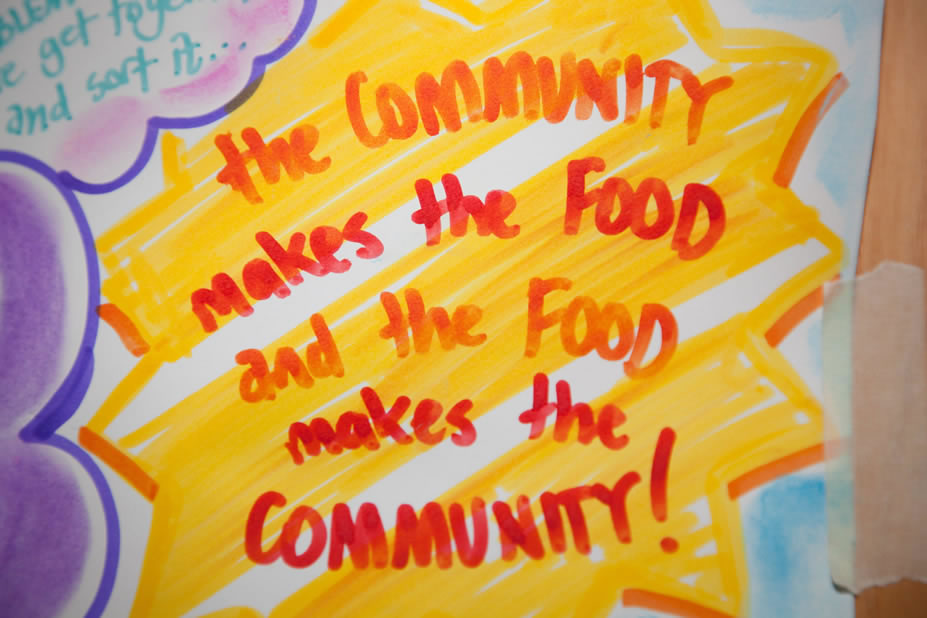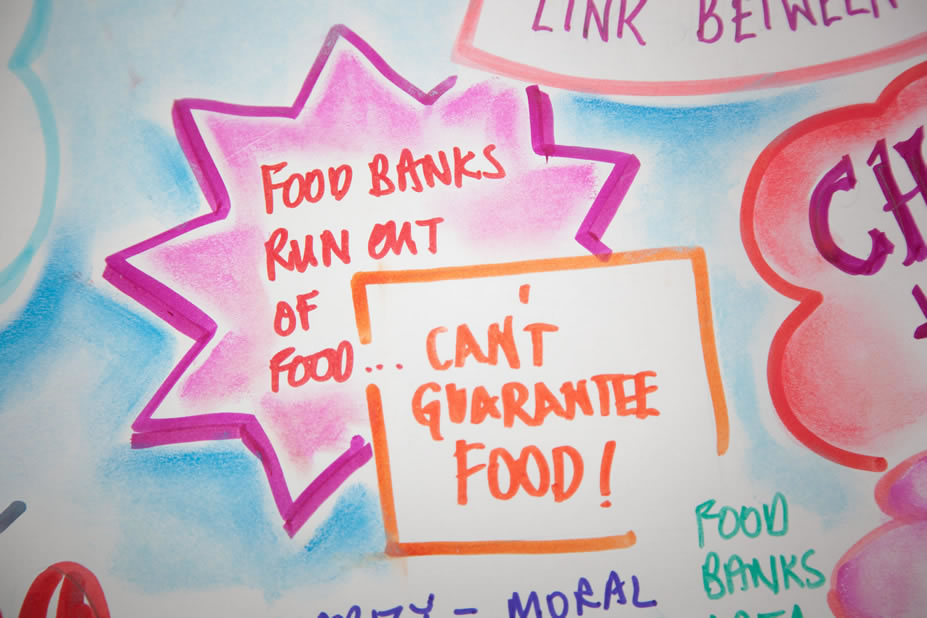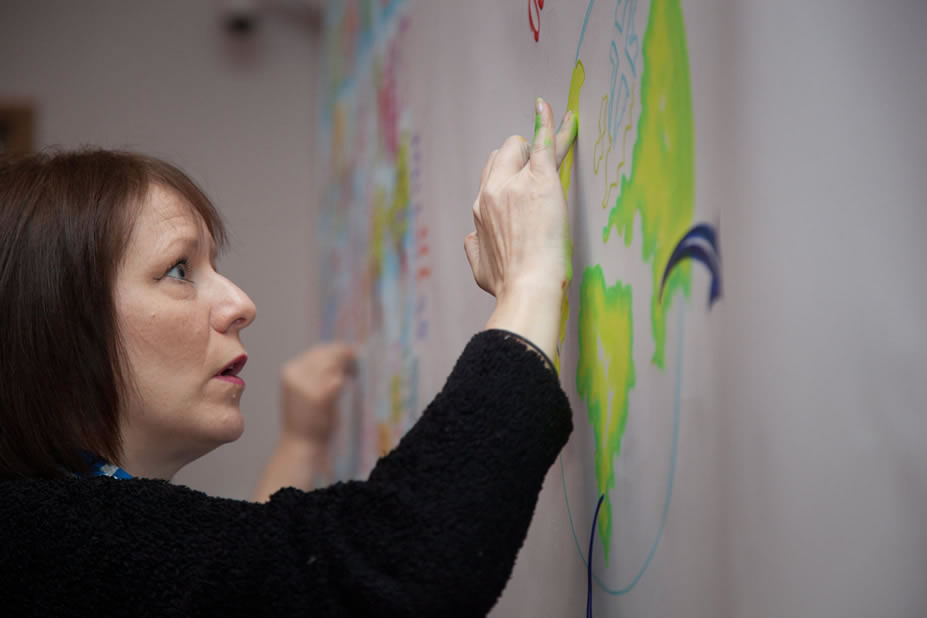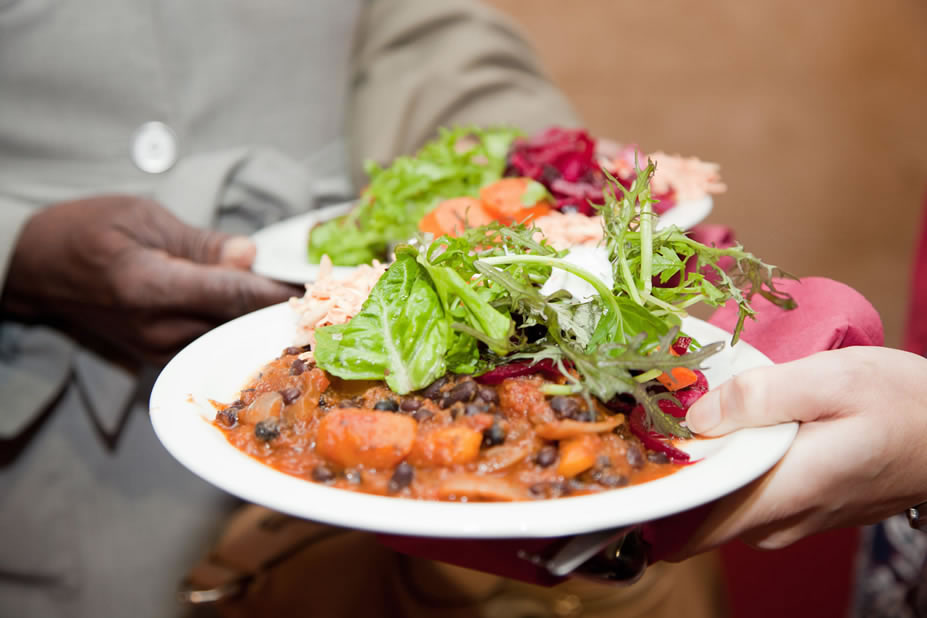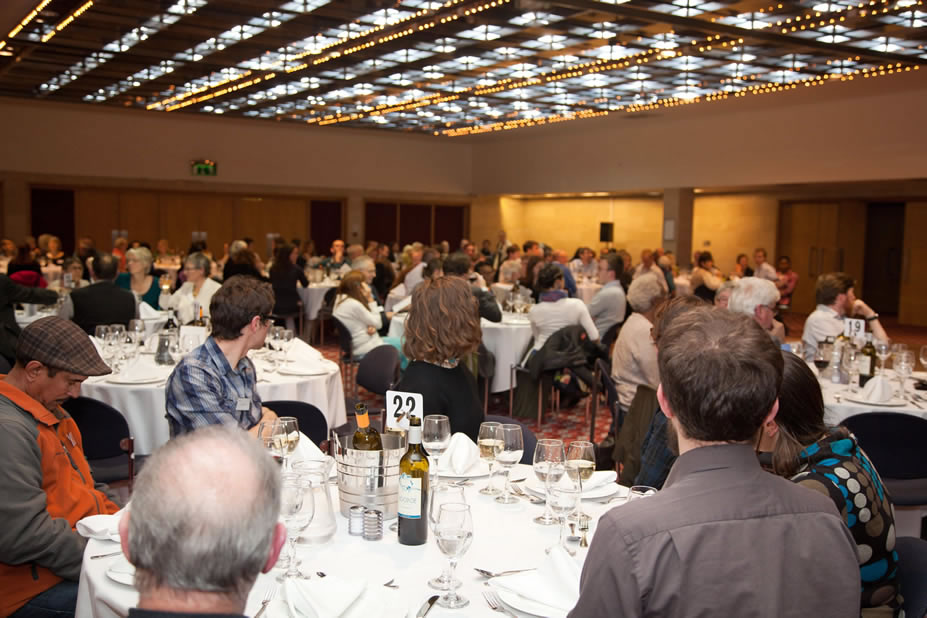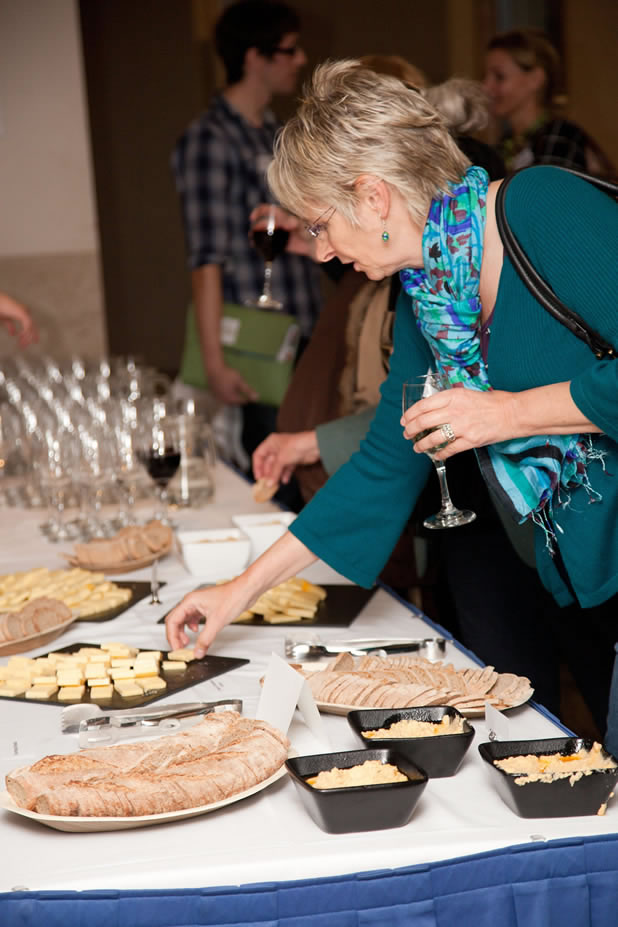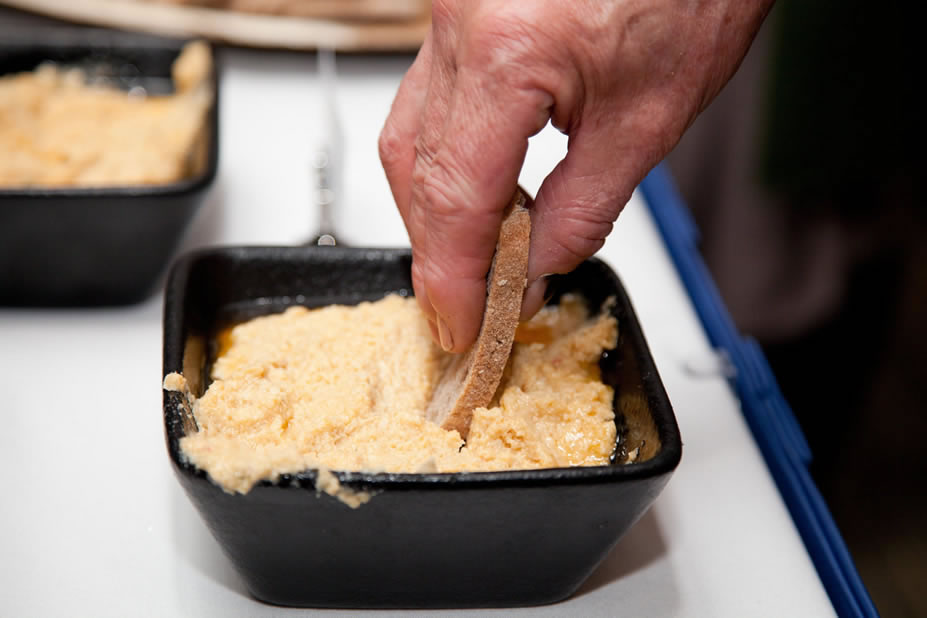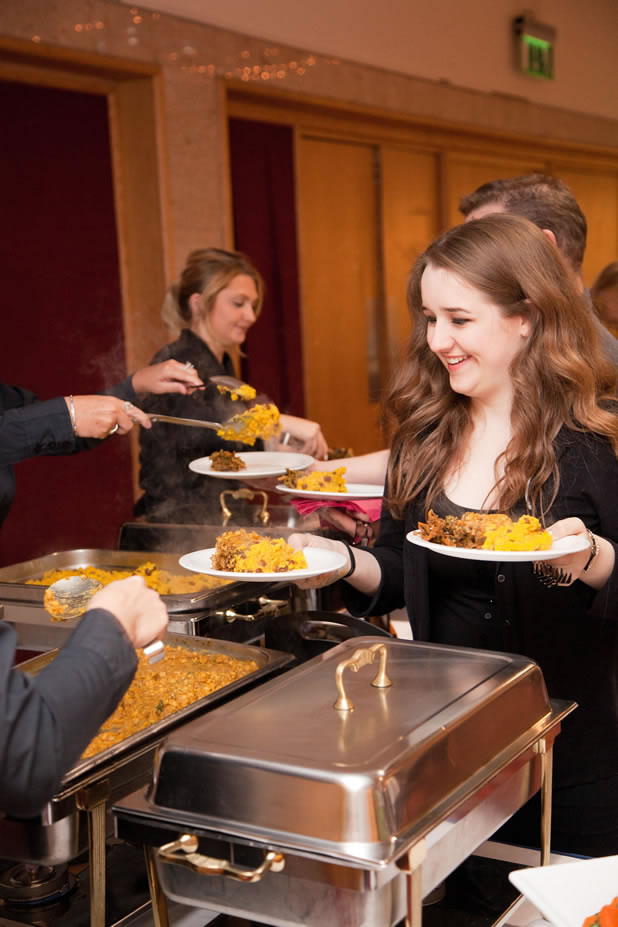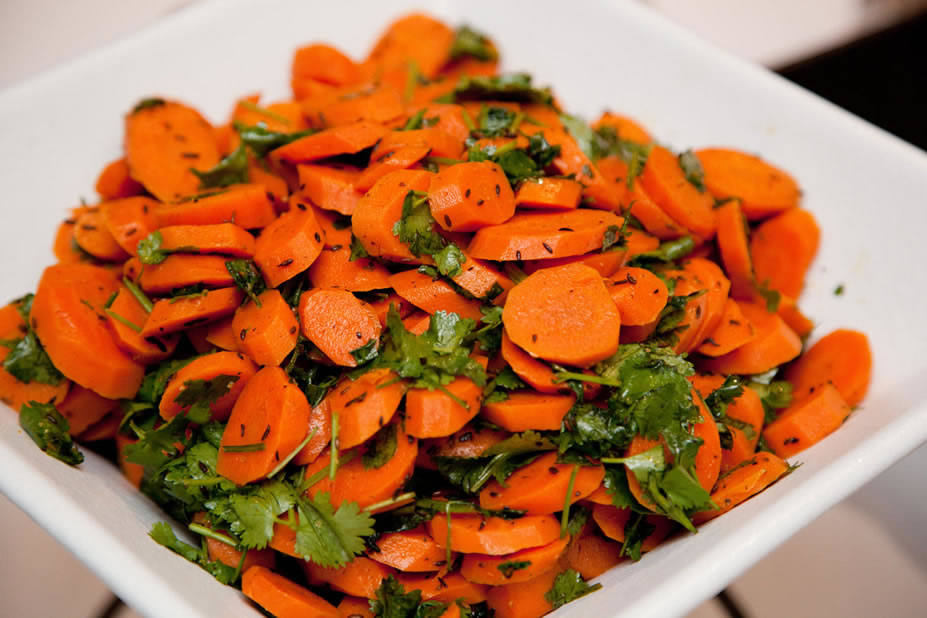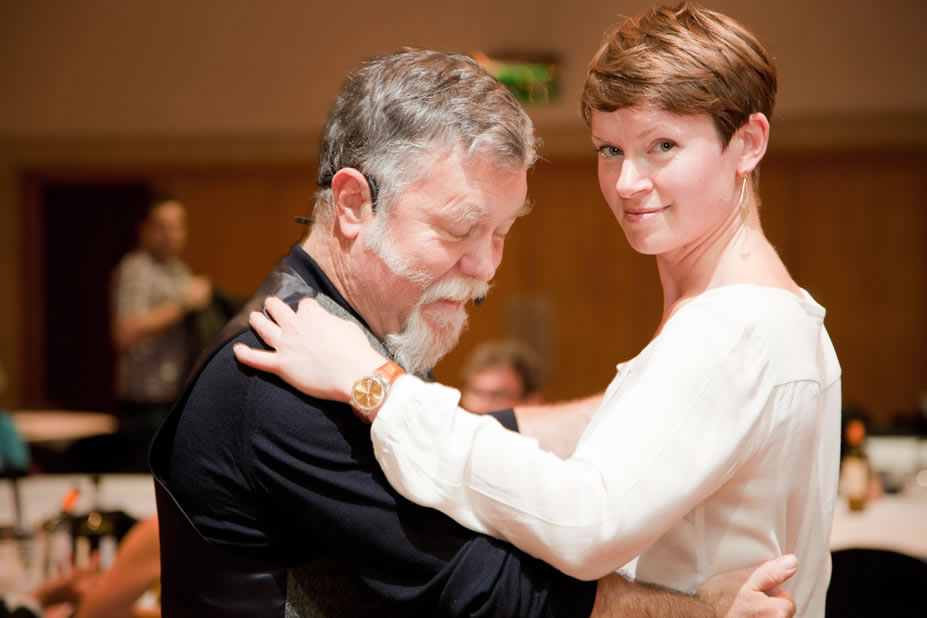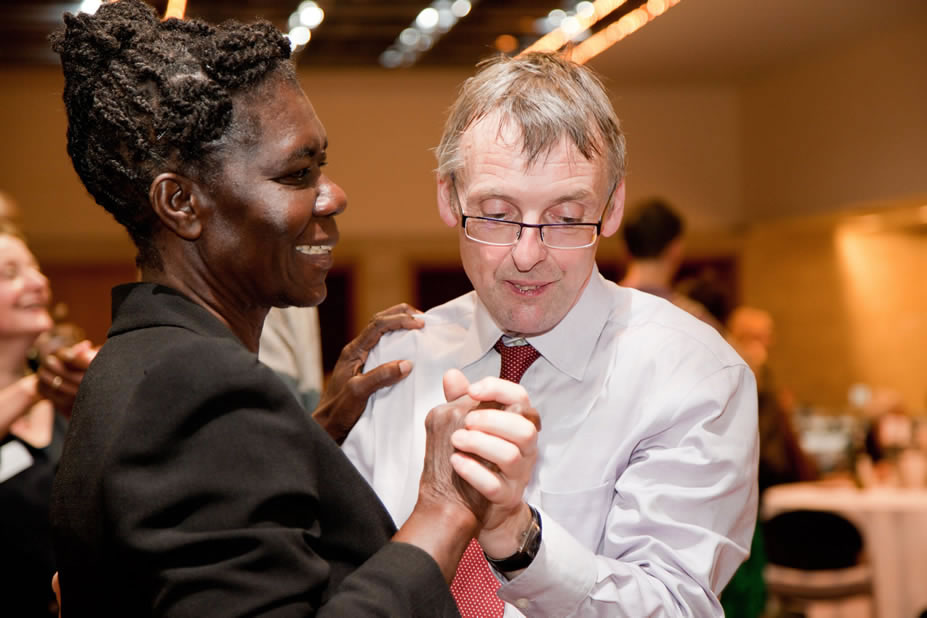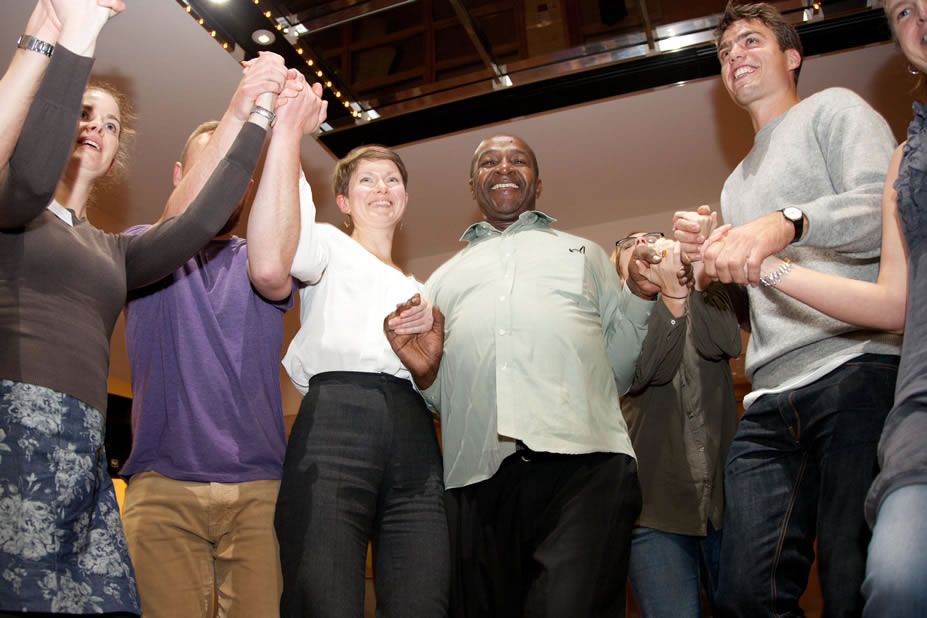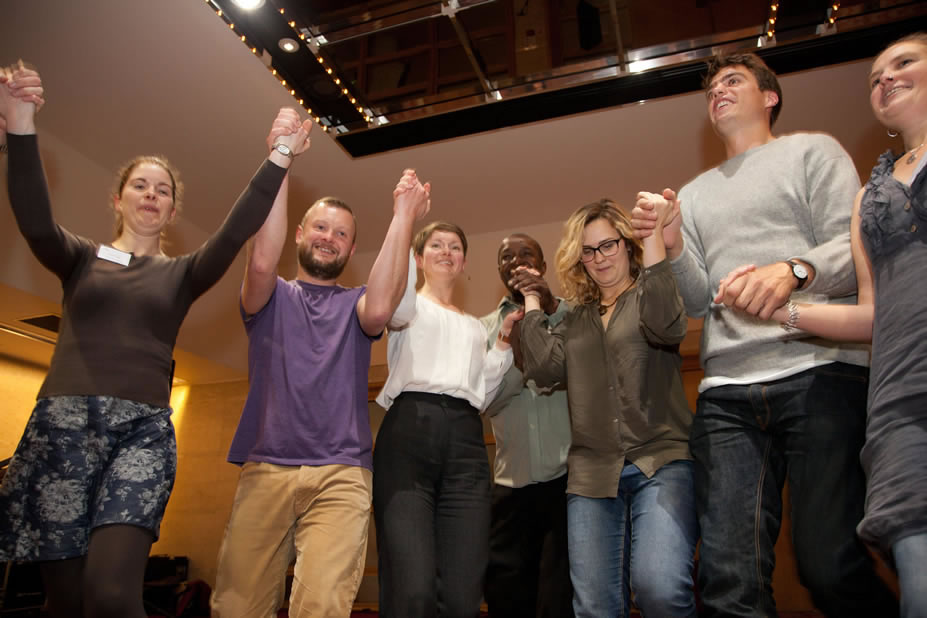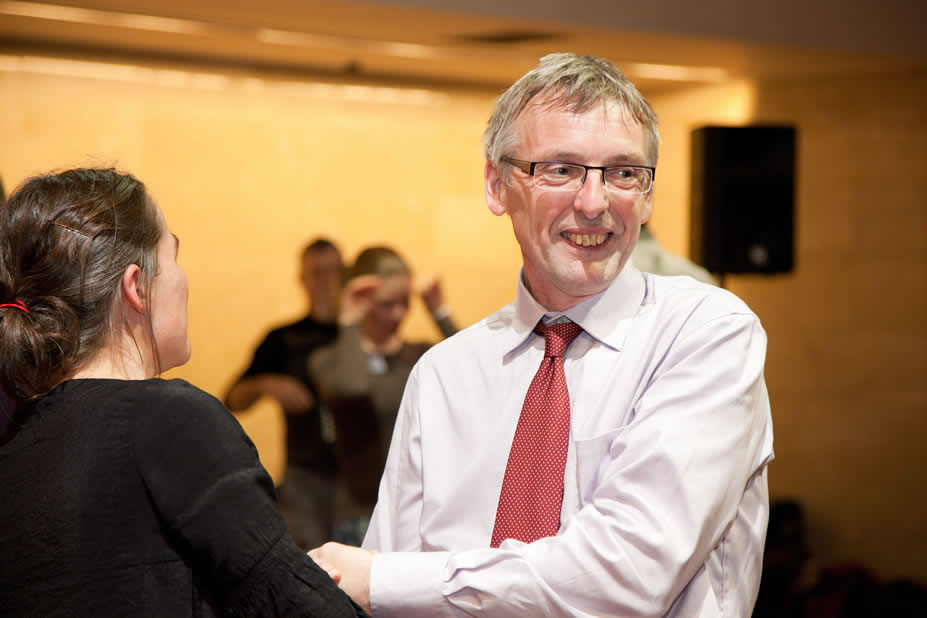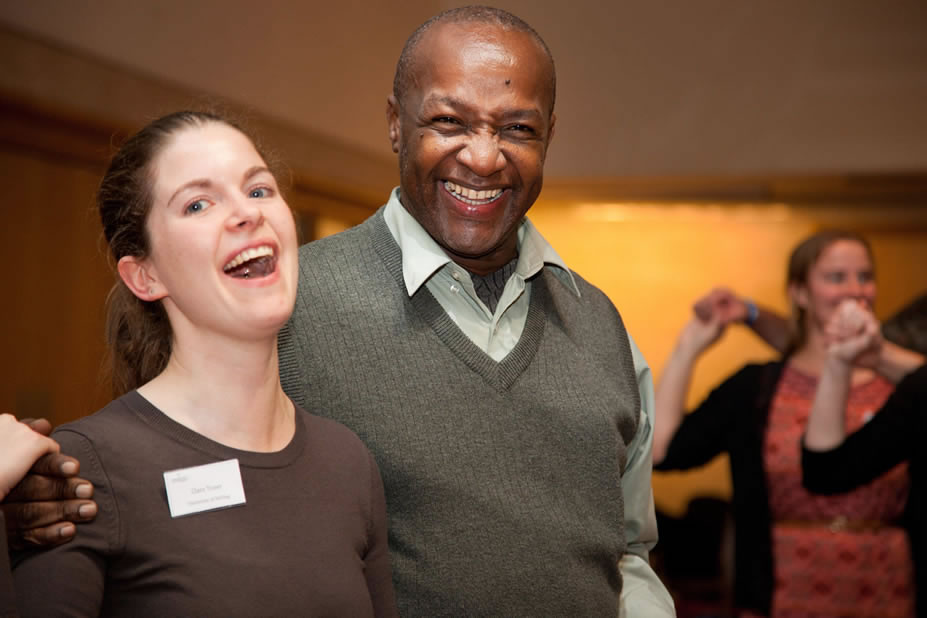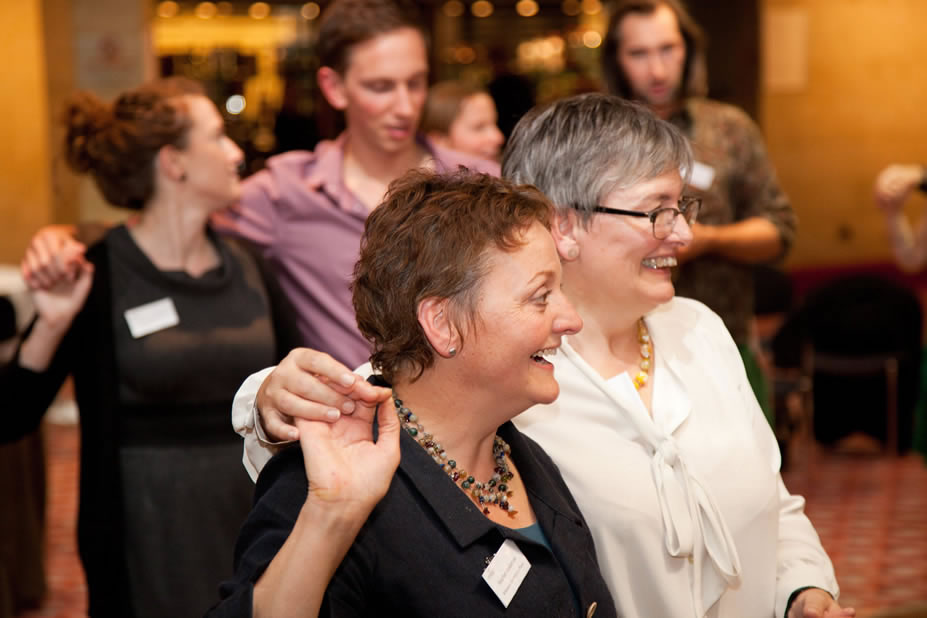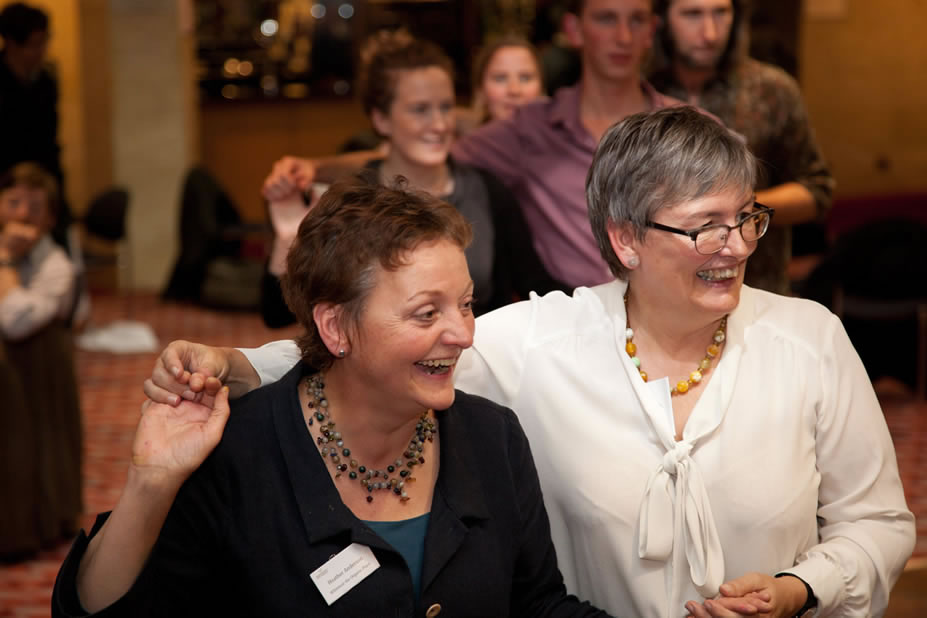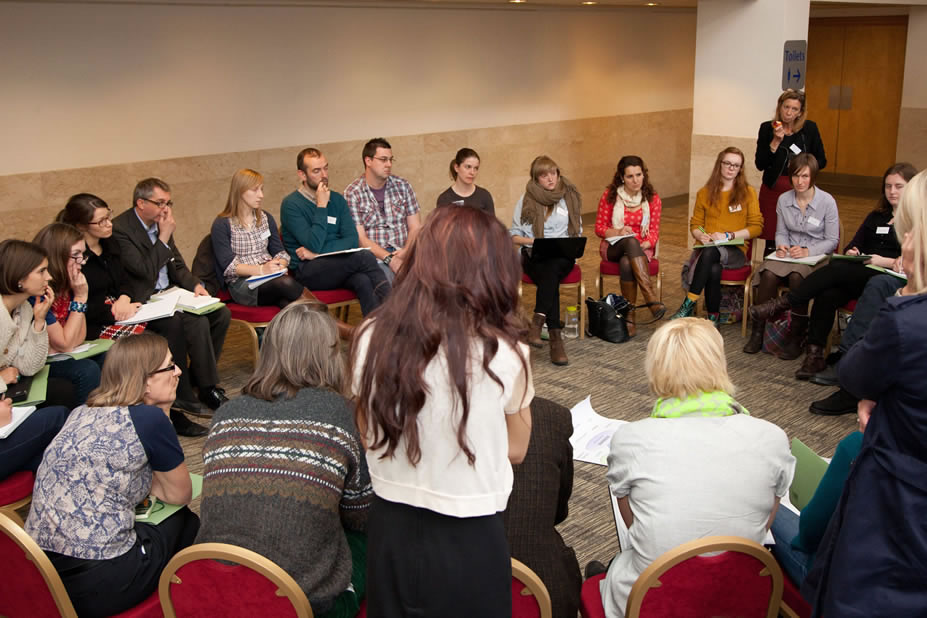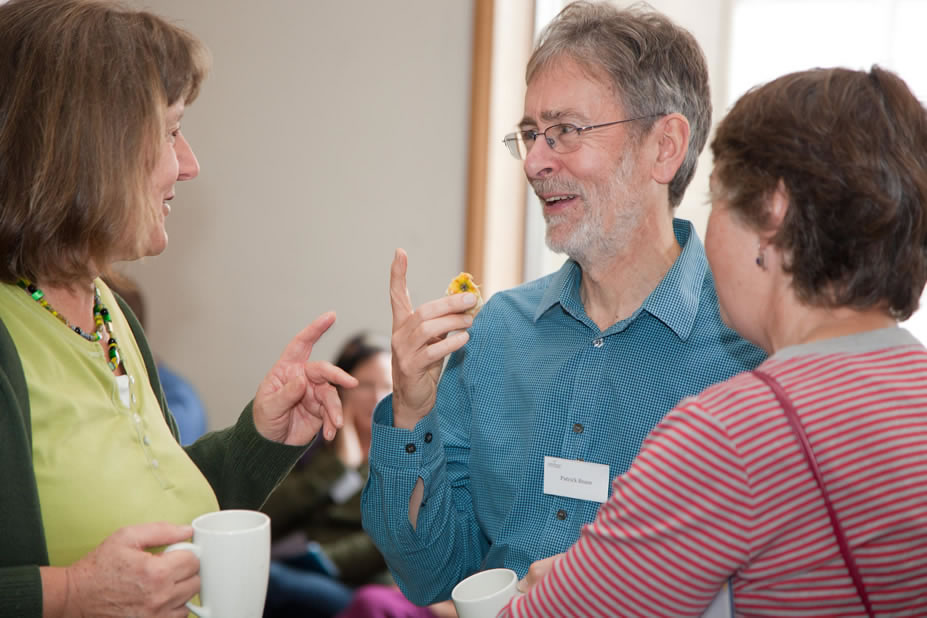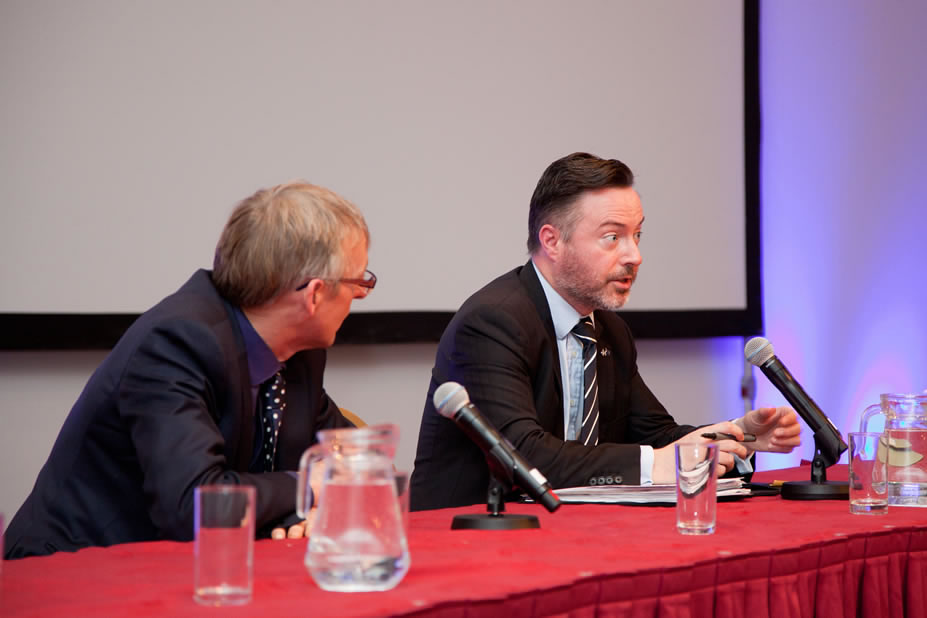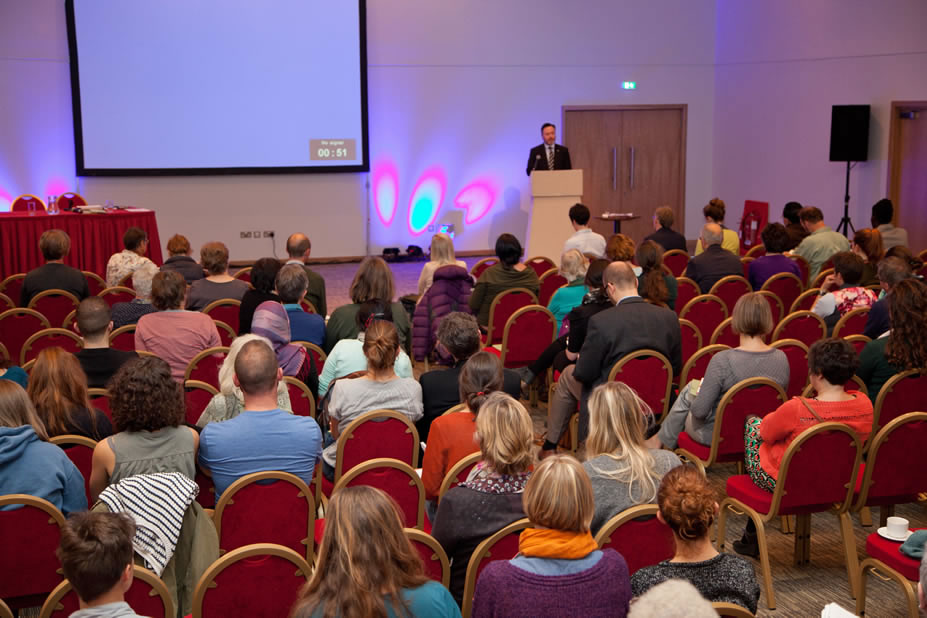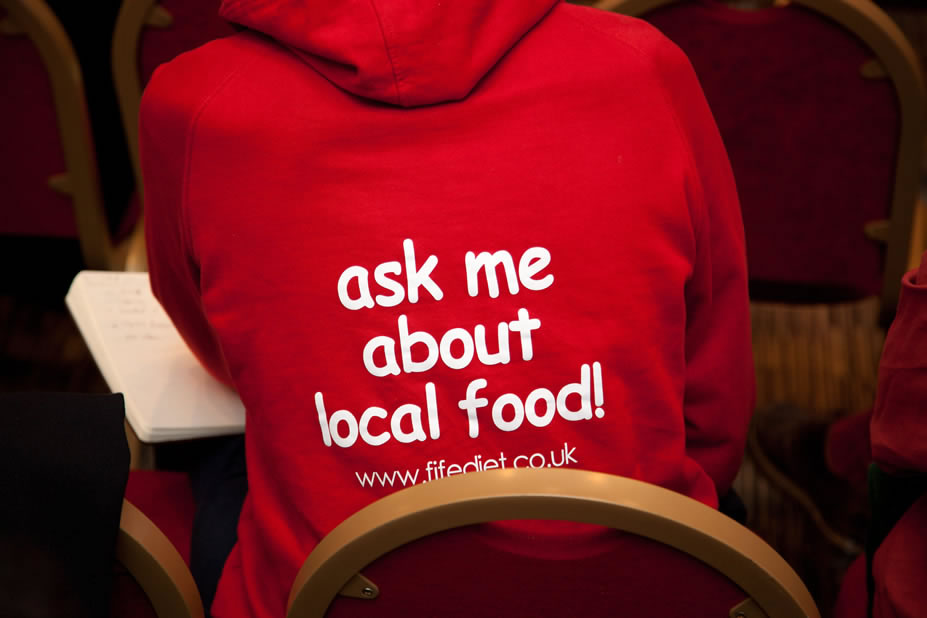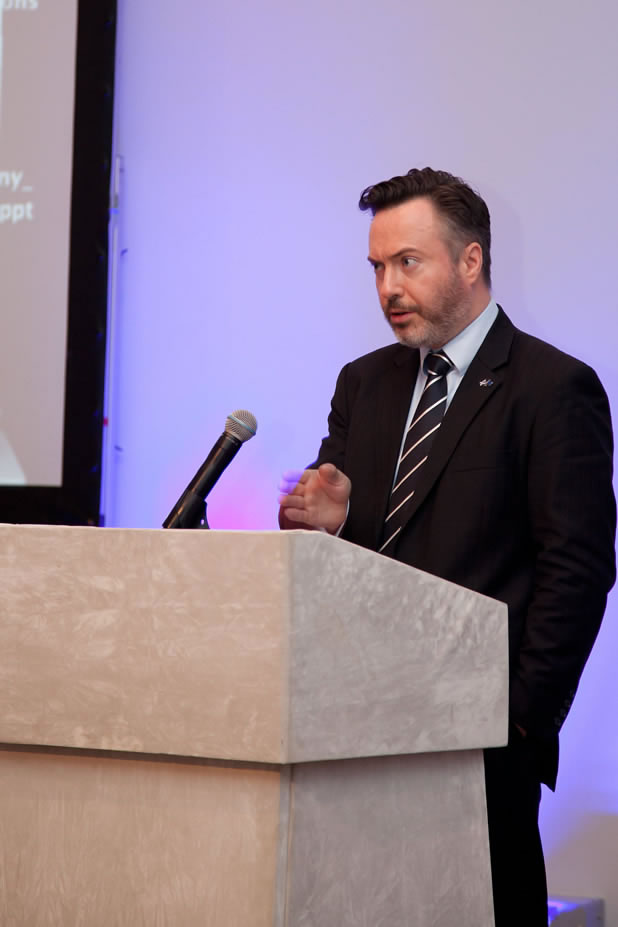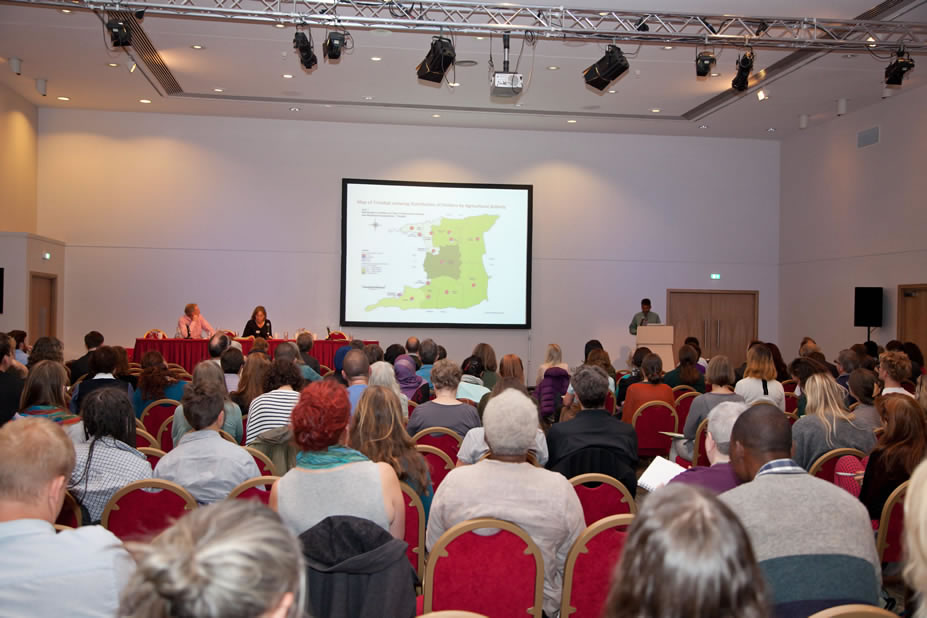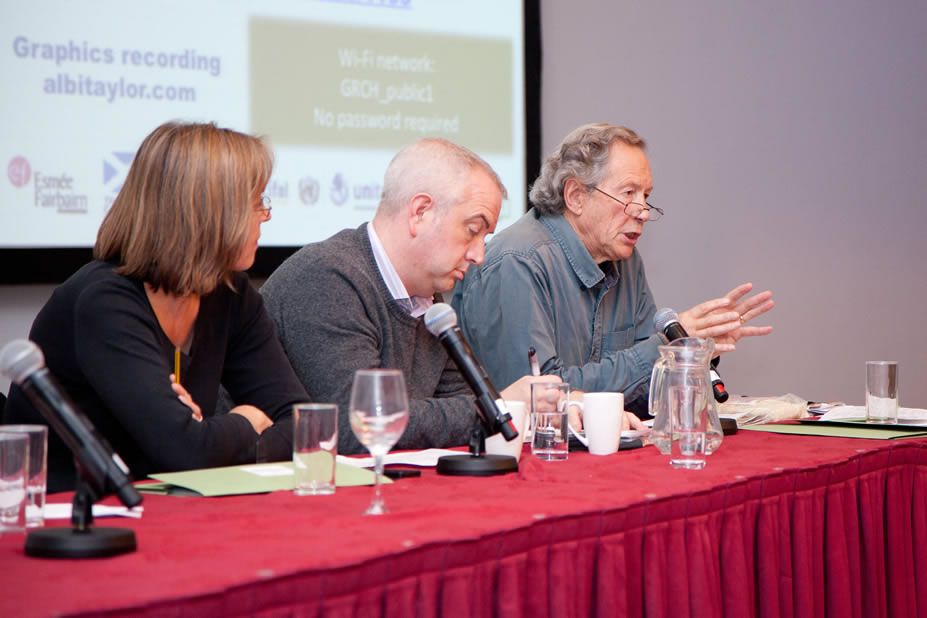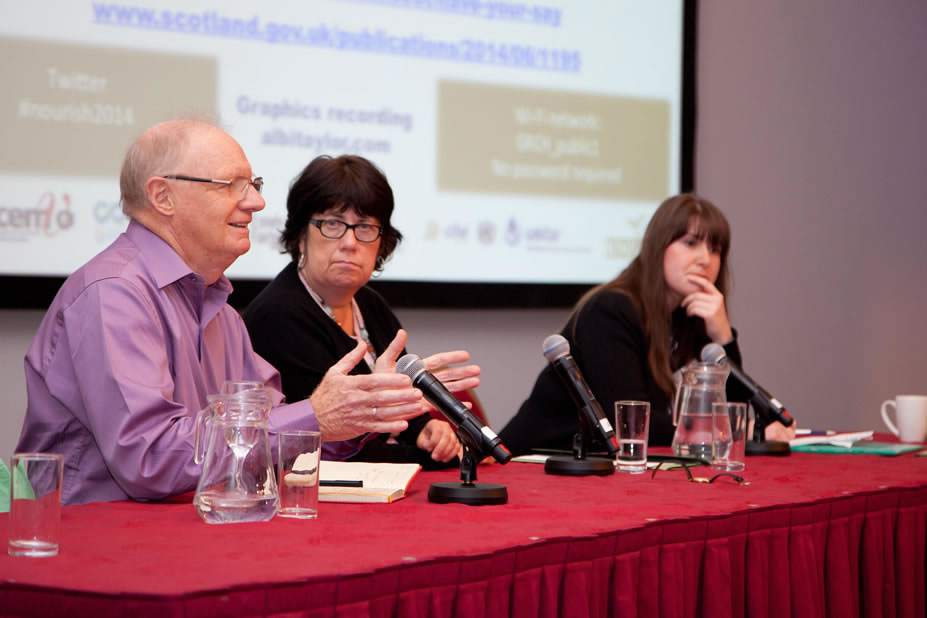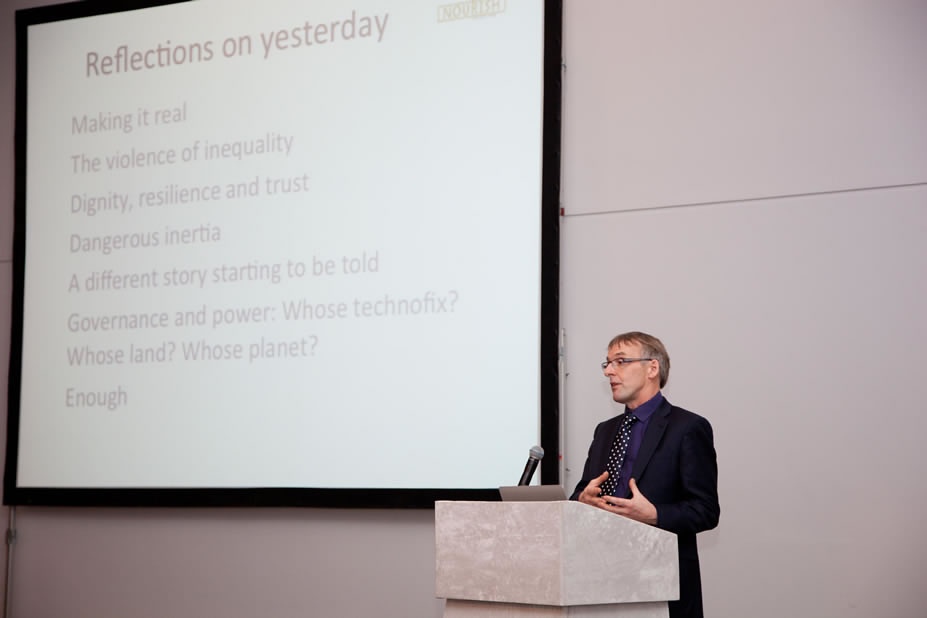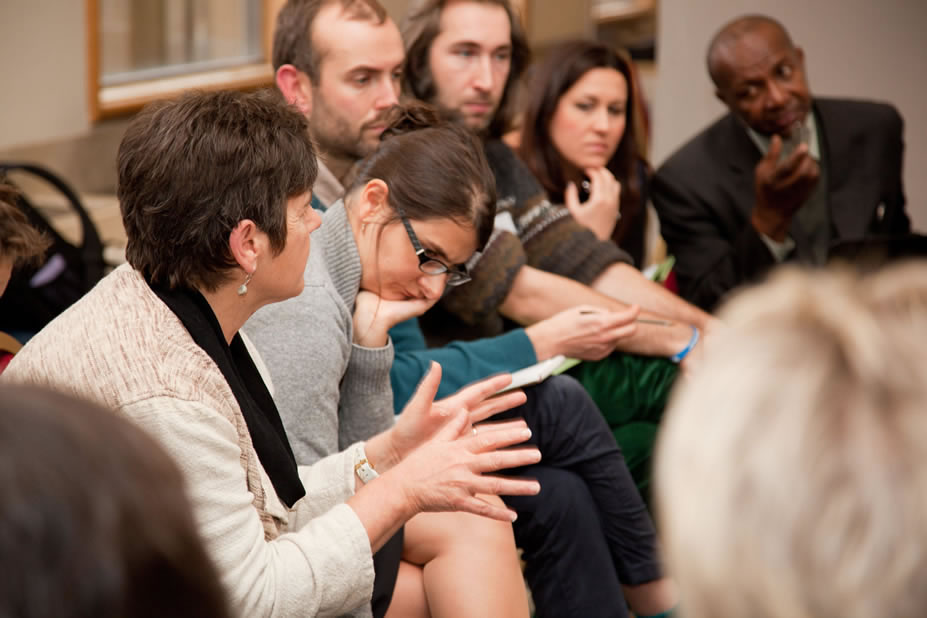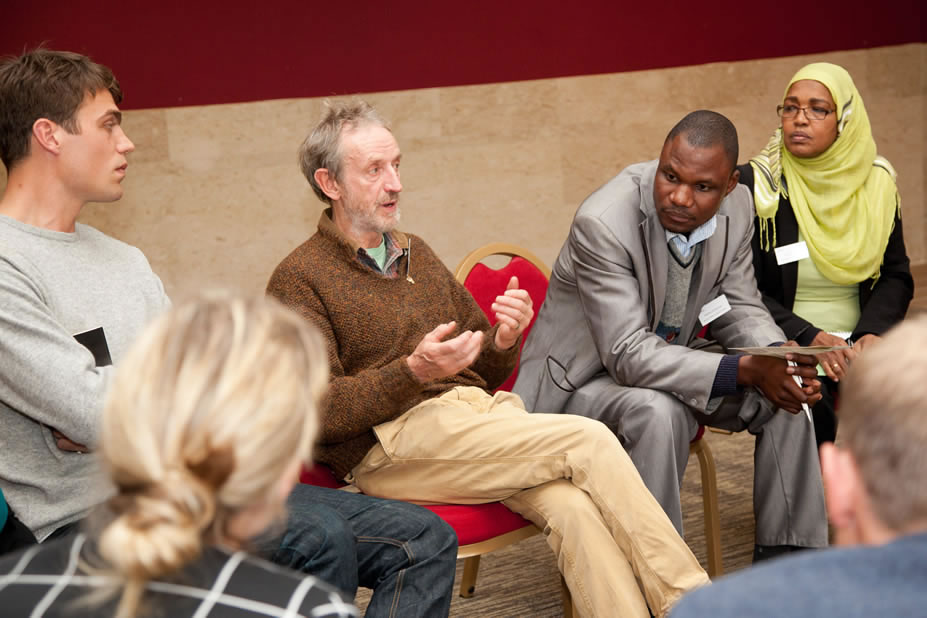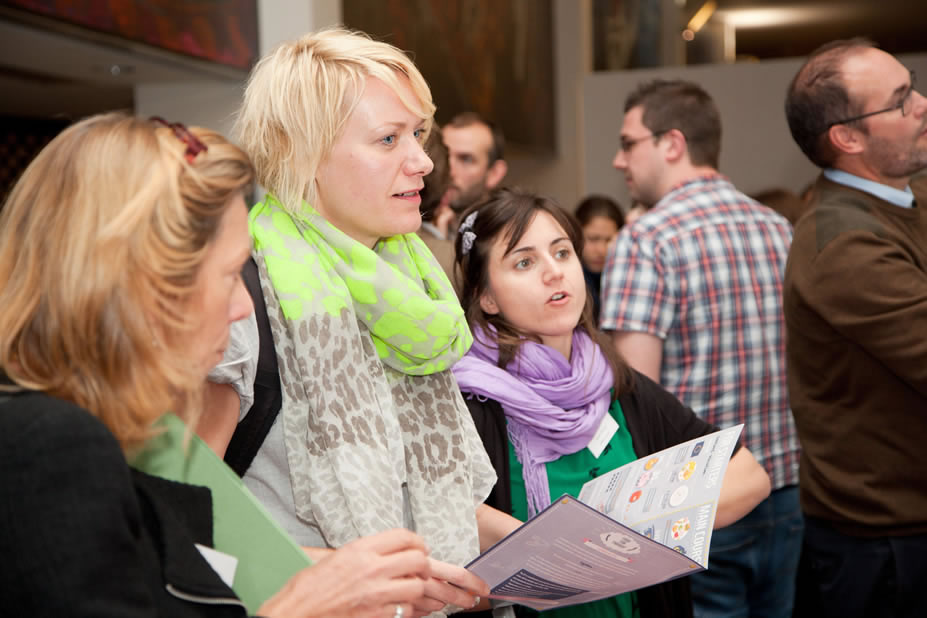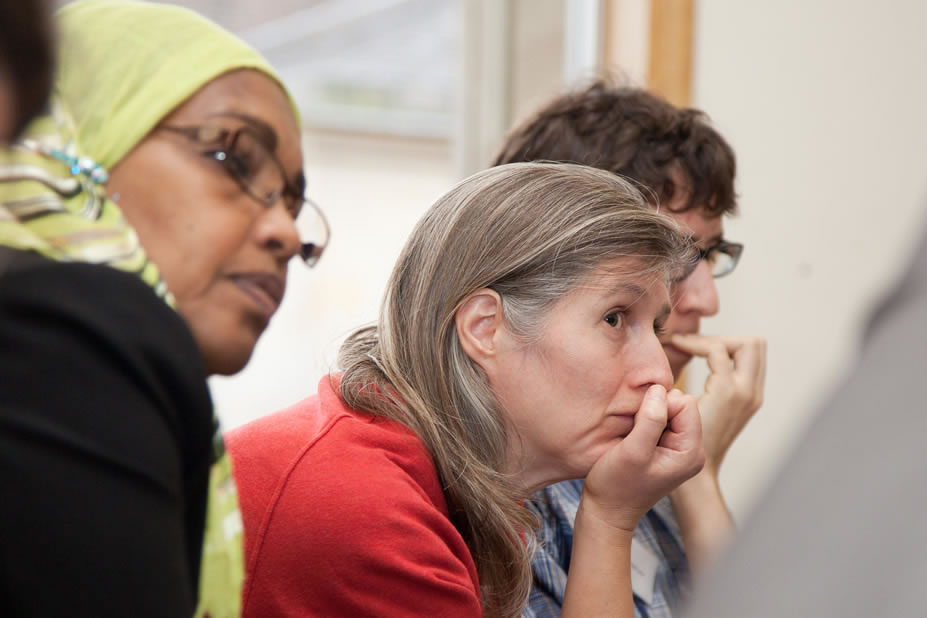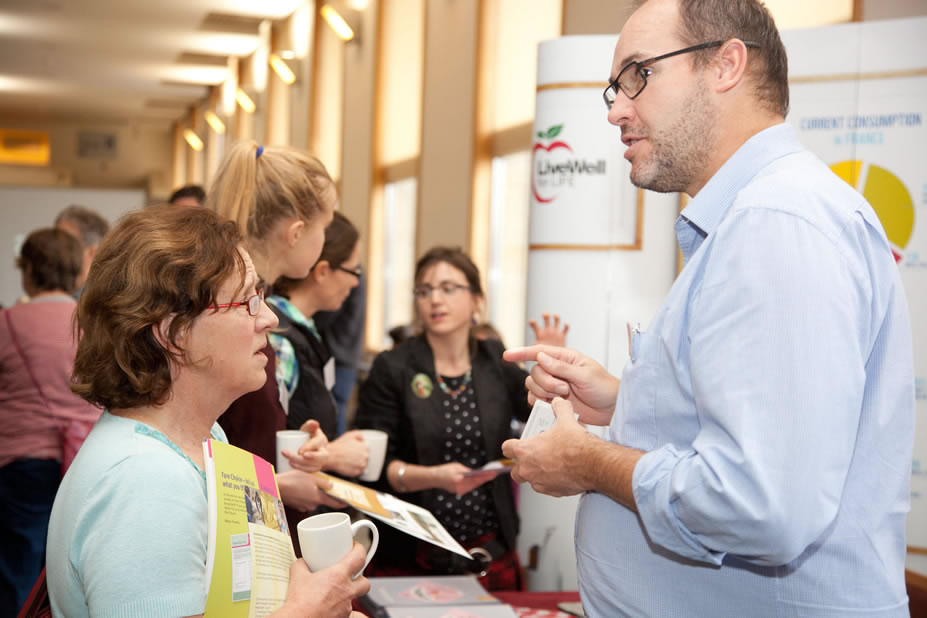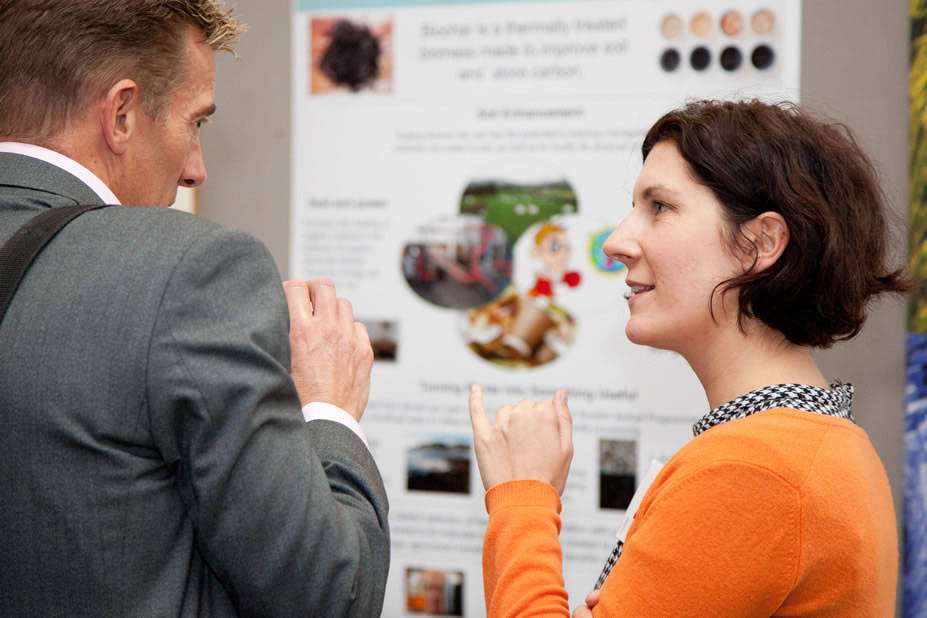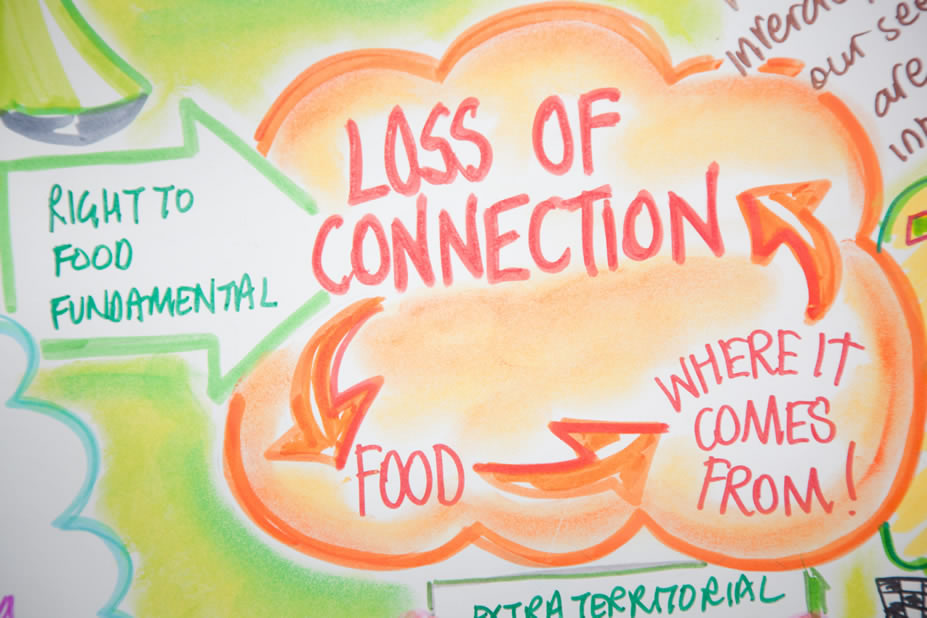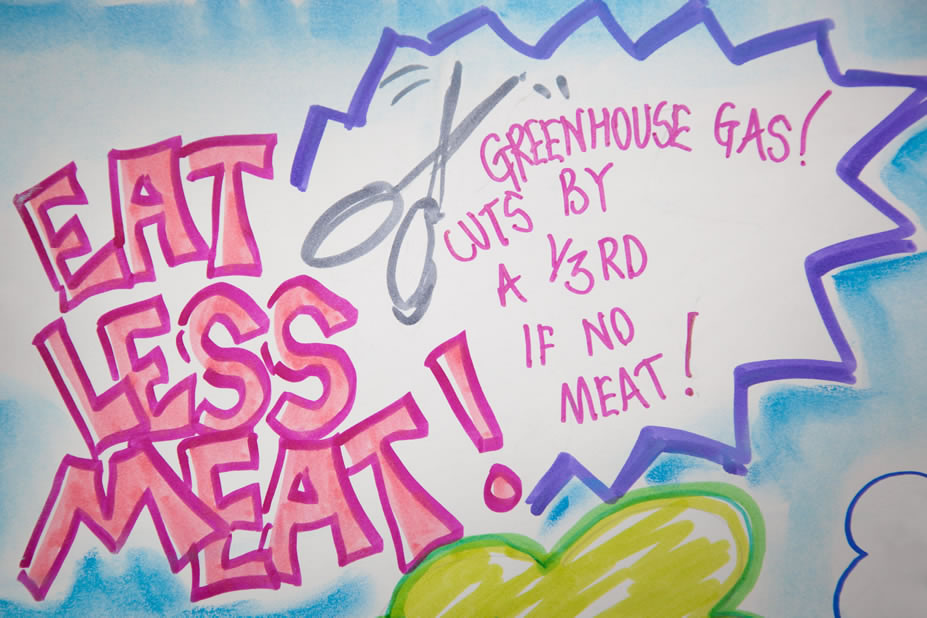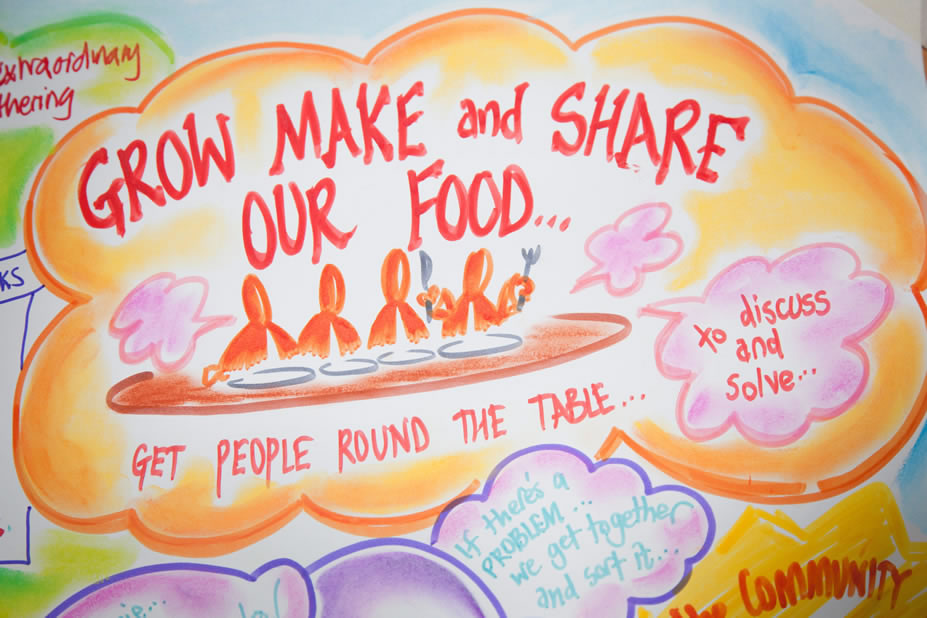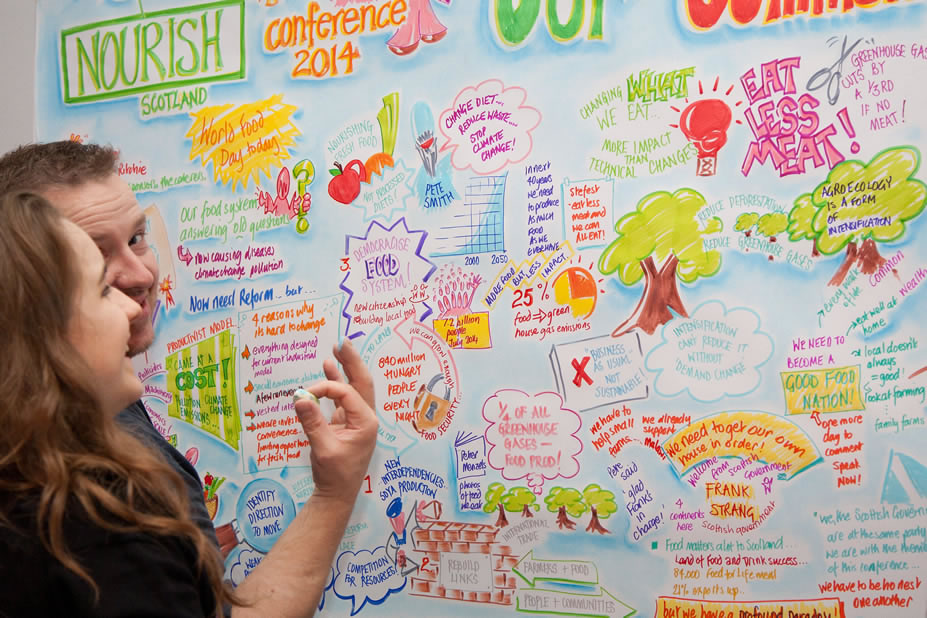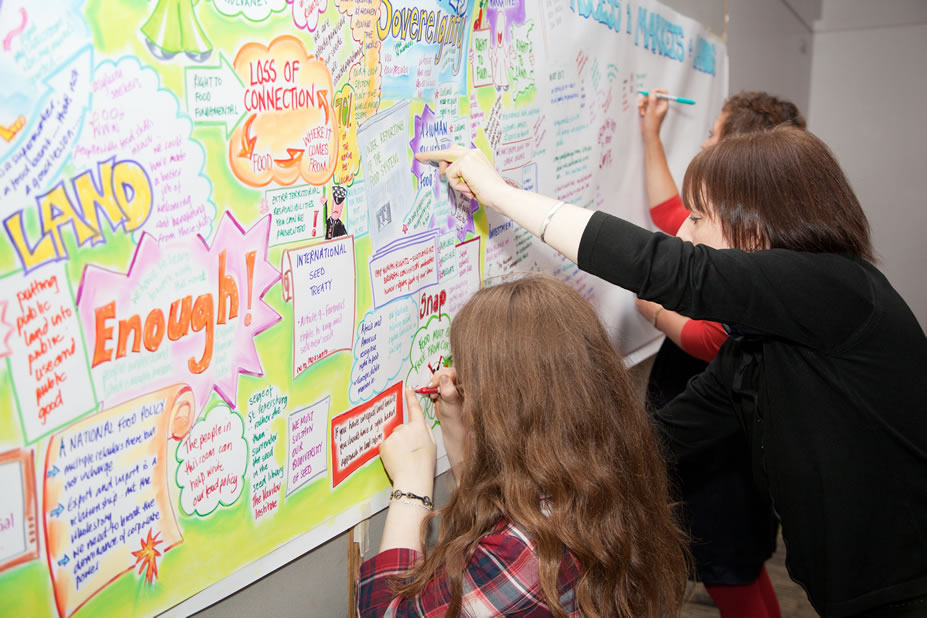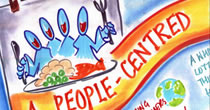
Download “A People Centred Approach to Food ” graphic recording JPG 1MB
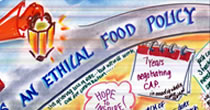
Download “Towards an ethical food policy” graphic recording JPG 2MB

Download “The Right to Food – Food Policy in Scotland” graphic recording JPG 2MB
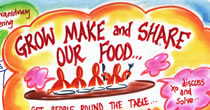
Download “Our Common Wealth of Food” graphic recording JPG 2MB
Conference Photographs (click to play)
Speaker Presentation Downloads
Introduction by Frank Strang, Scottish Government (PDF 477KB)
Glen Ramjag, Trinidad Food Crop Farmers Association (PDF 1.8MB)
Conference Title Slide (PDF 116KB)
Ian Cooke, Development Trusts Association, Scotland (PDF 2.3MB)
Michael Northcott, Professor of Ethics, University of Edinburgh (PDF 1.9MB)
Moira Sampson, Muddy Boots, Fife (PDF 1.8MB)
Rucha (PDF 1.6MB)
Patrick Mulvany, Food Ethics Council (PDF 376KB)
Terri Ballard, FAO Voices of the Hungry (PDF 1.3MB)
Alyn Smith MEP, EU Committee for Agriculture and EU Committee for Foreign Policy (PDF 1.75MB)
Sue Dibb, Eating Better (PDF 492KB)
“Community makes food and food makes community.”
Martin Johnston, Faith in Community Scotland
“The conversation needs to change from food poverty to the right to food.”
Graham Riches, University of British Columbia and world expert on food banks
“Small farmers will cool the world.”
Rucha Chitnis, Women’s Earth Alliance
These are just three of many inspiring quotes from the very successful #Nourish2014 conference.
Thanks so much to everyone who came, took part, gave inspiring talks, posed so many poignant questions, ran workshops and manned the fantastic stalls. Last but not least thanks to Encore Catering, The Royal Concert Hall and all our food providers for such delicious food and fantastic hosting.
The two days were packed to the hilt with talks and workshops that will no doubt be catalysts for action at many levels, from individuals to communities, NGOs and governments.
We are all now one step closer to making an ethical food policy for Scotland.
What did the conference look at?
Can we use a Common Wealth approach to food? There is enough food for everyone, but people go hungry in Scotland as well as in poorer Commonwealth countries. With increasing inequality, food poverty and diet-related diseases are escalating. Meanwhile, family farmers across the world are being squeezed off the land, and the food system is harming biodiversity and driving climate change, which in turn makes farming dangerously unpredictable.
At this year’s conference we shared experiences and ideas with farmers and policymakers from India, Malawi and the Caribbean countries. What would it take for everyone to eat well without messing up the planet? And how should Scotland play its part?
On the evening of October 16th – World Food Day and in the context of the UN Year of Family Farming, we also held a panel discussion on the role of human-scale farming for global food security. The evening was also a celebration, with a feast fusing Commonwealth and Scottish food, along with talks, poetry and a great ceilidh.
Our conference report gives you a good flavour of the two days and sums up the key messages from our speakers and the panel discussions. It also contains delegates’ proposals on principles and strategic actions for an ethical food policy for Scotland.
You can still a look at the Conference Programme for further details.
We also produced country profiles of India, Malawi, Trinidad & Tobago and Scotland to show some of the contrasts and parallels in these countries’ food systems.
Inspired by the conference to get more involved? Join here to take up this opportunity.
Do you have any follow up queries after the conference? If so, contact:
conference2014@nourishscotland.org.uk or 0131 226 1497
[wc_clear_floats]
Speaker Profiles
Dr Krishan Bir Chaudhary - Bharat Krishak Samaj
Krishan Bir Chaudhary is executive chairman of Bharat Krishak Samaj, India’s largest farmer organisation. He is a farmer and leader, known for his anti – GM and anti-globalisation views, and for speaking out about the losses incurred by local farmers in the light of agricultural globalisation and liberalisation.
Rucha Chitnis - Women's Earth Alliance
Rucha Chitnis supports the mission of different social justice philanthropy and women’s rights groups that are using a gender and rights-based lens to seed and strengthen food security, environmental and climate action in their communities. She is the former Director of Grantmaking at Women’s Earth Alliance, where she helped to build and launch WEA’s grantmaking efforts in South Asia and Mexico. Rucha’s interests include photography, poetry and writing, especially to highlight the power and potency of grassroots women to promote sustainable development in their communities and create just alternatives.Rucha has a masters in Sociology from University of Mumbai and Masters in Journalism from Ohio University. She is an advisor to One World Children’s Fund and a special projects consultant for the International Funders for Indigenous Peoples

Nick Dearden - World Development Movement
Nick Dearden is Director of World Development Movement, which campaigns against the root causes of poverty and inequality. It is a democratically-governed movement made up of local campaign groups based in towns and cities around the UK. Nick has a lot of experience in challenging the rich and powerful to bring about justice for the world’s poor majority. He started his career at War on Want, where he became a senior campaigner. He went on to be corporates campaign manager at Amnesty International UK, and director of the Jubilee Debt Campaign. Amongst other things, he is currently campaigning for trade that puts people before profits, taking on the Transatlantic Trade and Investment Partnership (TTIP) and trying to put a halt to the corporate power grab.

Jethro Greene - Caribbean Farmers Network
Jethro T. Greene comes from a rural, farming background and has accrued 30 years of experience in the development of the sector – particularly among farmers and rural communities in Saint Vincent and the Grenadines, and the Caribbean region.
A graduate of the COADY International Institute at Saint Francis Xavier University in Canada, Greene places a high premium on innovative leadership strategies that will build capacity in the agriculture sector, rural communities and with those on whom the future of development rests – our youth and empowerment of people.
Currently the Chief Coordinator of the Eastern Caribbean Trading Agriculture Development Organization (ECTAD) and the Caribbean Farmers’ Network (CaFAN), Greene is also a director of the St. Vincent and the Grenadines Chamber of Industry and Commerce, the St. Vincent and the Grenadines National Development Foundation, and a member of the CARICOM Food and Nutrition Technical Working Group and CARICOM Common Agriculture Policy Working Group. He also provides training and consultation to several national and regional organizations and international organisations and institutions.
Charles Henderson - Climate Futures
Charles Henderson is founder and director of Climate Futures, an organisation of environmental specialists and communicators aiming to bridge the gap between environmental research and the real world. Charles combines a technical background with experience in research, policy development and communication. He holds an MSc in Environmental Technology from Imperial College, London, is currently studying an MSc in forestry part-time, and also has a diploma in journalism.
Katharine Jenner - Nutritionist
Katharine Jenner has an MSc in Public Health Nutrition from the University of Southampton. She is campaign director of Action on Sugar, which is a coalition of leading health experts seeking to tackle and reverse the obesity and diabetes epidemics through raising public awareness and improving policies in regards to sugar consumption. Katharine is also a visiting lecturer on nutrition at several UK Universities, delivers healthy eating sessions for people living with HIV, and chairs the Campaign for Better Hospital Food.
Martin Johnstone - Faith in Community Scotland
Martin Johnstone is chief executive of Faith in Community Scotland, an organisation that works together with faith groups to support the economically poorest communities in Scotland. It provides a range of training, advice, funding and support to faith groups and encourages them to work in partnership with others to build flourishing communities.

Dr Jennie Macdiarmid - University of Aberdeen
Jennie Macdiarmid is a senior research fellow at the University of Aberdeen. Her current research is focused on the impact of diets on climate change; she is aiming to define what constitutes a healthy and environmentally sustainable diet, both for climate change mitigation and public health. She is developing evaluation frameworks for nutrition related policy and interventions.
Professor Michael Northcott - Professor of Ethics at the University of Edinburgh
Michael Northcott is Professor of Ethics at the University of Edinburgh. He is best known for his research and writing on the ethical and theological implications of climate change and the ecological crisis. He has authored or edited ten books and over eighty research papers. His research on the political theology of climate change connects the contemporary failure to mitigate climate change with the way in which philosophy and political theory from Descartes to Kant disembedded human consciousness and political organisation from the nonhuman world.

Martin Rhodes - Scottish Fair Trade Forum
Martin Rhodes is the director of the Scottish Fair Trade Forum, he became involved with Fair Trade through campaigning on a number of international development and trade justice issues. The Scottish Fair Trade Forum works to maintain and develop Scotland’s Fair Trade Nation status by integrating Fair Trade principles into decision-making at all levels of government, encouraging the business community to sell Fair Trade products, and engaging the broader public in the role of Fair Trade in creating a more sustainable world.
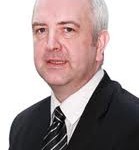
John Riches - Just Trading Scotland
John Riches set up Just Trading Scotland after many years of marketing the goods of small-scale producers to fund development projects. Just Trading Scotland aims to offer suppliers free and fair access to Western markets, by creating supply chains from producers – mostly smallholder farmers and craft workers – via processors and exporters to wholesalers and retailers in the UK which are equitable and non-abusive. In this way, all may share fairly in the creation of common wealth and goods.
Professor Olivier De Schutter - former UN special rapporteur on the right to food
Olivier De Schutter is a professor of law and an expert on social and economic rights as well as on trade and human rights. Between 2004 and 2008 he served as a Secretary General of the International Federation for Human Rights (FIDH). He was appointed as the UN Special Rapporteur on the Right to Food in 2008, and produced a landmark report in 2011 entitled ‘Agroecology and the Right to Food’, which demonstrated that agroecology, if sufficiently supported, can double food production in entire regions within 10 years while mitigating climate change and alleviating rural poverty.

Professor Pete Smith - Soils & Global Change, University of Aberdeen.
Pete Smith is a Professor of Soils & Global Change at the University of Aberdeen. He is Science Director of Scotland’s Climate Change Centre of Expertise, Director of Food Systems of the Scottish Food Security Alliance-Crops, and leads the University-wide theme, Environment and Food Security. He was a convening lead author for the Agriculture and Forestry Chapter of the Intergovernmental Panel on Climate Change (IPCC) Fifth Assessment Report, (2010-2014). He is currently involved in numerous projects, which link his primary research interests of agricultural and land based options to mitigate climate change, environmental and agricultural sustainability, and food security.

Duncan Wilson - Scottish Human Rights Commission
Duncan Wilson is head of Strategy and Legal at the Scottish Human Rights Commission. He has worked primarily on economic, social and cultural rights, mostly at the international level, for around 15 years. The Scottish Human Rights Commission in currently engaging with food security, land reform and an adequate standard of living as part of the implementation of Scotland’s National Action Plan for Human Rights.
Dr Marisa Wilson - School of Geosciences, University of Edinburgh
Marisa Wilsonis a Chancellor’s Fellow in Human Geography at the School of Geosciences, University of Edinburgh. She is currently researching a project comparing food networks and dietary change in the former colonial and imperial worlds, exploring crossovers in geography and anthropology. Her research relates large-scale projects to ‘develop’ or improve food systems to localised experiences, understandings and practices of food production, exchange and consumption. She examines how pressing global issues such as the need to feed people in a healthy and sustainable fashion are tackled – with more or less success – by governments, but also by smaller-scale ‘communities’.
Dr Terri Ballard - public health, nutrition and food security expert.
Terri J. Ballard has worked on issues of food security and nutrition measurement for more than 12 years. She has been instrumental in validation of experience-based food insecurity scales and dietary diversity scores and has collaborated with the FANTA Project on developing the Household Hunger Scale, an impact indicator for the Feed the Future monitoring framework. She was organizer and scientific chair of the International Scientific Symposium on Food and Nutrition Security information: from Valid Measurement to Effective Decision Making, held in Rome in January, 2012.She is a founding member of the Voices of the Hungry Team in the Statistics Division of FAO, which is validating a globally comparable food insecurity scale – the Food Insecurity Experience Scale (FIES).
Terri holds a doctorate of public health (DrPH) in maternal-child health and epidemiology from the University of California at Los Angeles.
Nigel Miller, National Farmers Union Scotland
Nigel Miller is president of the National Farmers Union in Scotland; he blogs regularly on the latest agricultural news in Scotland and is well placed to present his ‘view from the top’ to this years’ Nourish conference. He farms 550 hectares in partnership with two of his sons in the Scottish Borders. Nigel, a former vet, started his NFU Scotland career as Chairman of the West Berwick Branch and is a past Chair of the Livestock Committee. Nigel was Vice-President from March 2007 and elected President in 2011.
Jamie Livingstone, Head of Oxfam Scotland
Jamie is a former print and broadcast journalist, including Political Correspondent on STV News. He joined Oxfam in 2011 as Campaigns and Communications Manager, overseeing Oxfam’s campaigns, media output and supporter communications in Scotland. In late 2013 he was appointed Acting Head of Scotland and took on the substantive role in April 2014.
Sheila Dillon - Food journalist & BBC Radio 4 Food Programme presenter
Sheila Dillon has been a food journalist for almost three decades, and for 20 years she has worked on BBC’s The Food Programme, first as reporter, then producer and now presenter. Her investigative work has won many awards including the Glaxo Science Prize, Caroline Walker award and several Glenfiddich Awards, most recently for her documentary on the history of the American meat industry.
In the late 1980s and 90s she and Derek Cooper covered the breaking scandal of BSE, the rise of GM foods, the growth of the organic movement from muck and magic to multi-million pound business, the birth of the World Trade Organisation and irradiation at a time when those subjects were not even a gleam in a newshound´s eye. Recent programmes on the chocolate industry, fishing practices and food prices carry on the tradition. She is also the creator of Radio 4’s first interactive grocery show, Veg Talk.
Glen Ramjag - agricultural teacher and founding member of Trinidad National Foodcrop Farmers’ Association
Glen Ramjag is from Port of Spain, Trinidad. He’s an instructor with the Youth Training and Employment Promotion Programme at a maximum-security prison, currently teaching classes on Crop Production and Amenity Horticulture. As well as being a founding member of the National Foodcrop Farmers’ Association (NFFA) and he presently serves as their Vice President of Education.
Glen has also worked with a number of NGO’s throughout the Caribbean in designing, implementing, and funding community based projects. He’s worked at several squatter regularisation projects in Trinidad and is the former director of the Agricultural Development Bank of Trinidad and Tobago.
Glen also has a keen interest in issues involved in land settlement and food security.
Graham Riches - University of British Columbia in Canada - Director of the School of Social Work and Family Studies.
Graham Riches joins us from the University of British Columbia in Canada, where he is the director of the School of Social Work and Family Studies. His work focuses on the risk involved in institutionalizing food banks and how social policy can be a key tool in reducing hunger.
He has taught in Canada, Australia, and Hong Kong in the field of Social Work for several years at a number of different universities. He has also worked in community development in Malaysia/Sarawak, Tanzania, as well as in the UK in London and Liverpool.
He is a co-founder of the Canadian Review of Social Policy and a board member for the Canadian Council on Social Development and the Vancouver Food Policy Organization. He is a Research Associate of the Canadian Centre for Policy Alternatives and a member of the BC Social Work Education Consortium, the BC Association of Social Workers, FarmFolkCityFolk and the Canadian Food Security Network.
Alyn Smith - MEP and member of the EU Foreign Affairs Committee

Alyn Smith is a Glasgow Native and a SNP representative in European Parliament. He’s a member of the EU Foreign Affairs Committee and an alternate member of the Agriculture Committee and the Industry, Research and Energy Committee. A director of both LGBT Youth Scotland and Turning Point Scotland, Alyn has an extensive background in law and has been an advocate for both the environment and Scotland’s growers in the EU Parliament.
Suman - Food First Information and Action Network (FIAN) India
Suman, a representative from the Food First Information and Action Network (FIAN) will speak about the right to food at the conference. Suman is currently on the International Executive Committee (IEC) for FIAN, an international human rights organization that has advocated for the realization of the right to adequate food for more than 25 years.
Suman’s background experience revolves greatly around advocating for the rights of child laborers in India, fighting for their right to a healthy childhood. She has also been involved with their rehabilitation and education, showing that recovery from these dire situations is possible. She is a founding member of the National Coalition for Education as well as being a driving force behind the Education for Liberation, Liberation for Education national campaign in India.
Sue Dibb - Coordinator of Eating Better: for a fair, green, healthy future
Sue Dibb is coordinator of Eating Better: for a fair, green, healthy future – an alliance to help people eat less and better meat and more foods that are good for people and the planet.
Sue is passionate about the need to create healthy, fair, sustainable food systems and the importance of governments, businesses and civil society working together to enable this transition.
Her previous roles include Director of the Food Ethics Council, Head of Sustainable Consumption and Production at the government advisory body, the Sustainable Development Commission, Senior Policy Advisor at the National Consumer Council and Co-Director of the Food Commission.
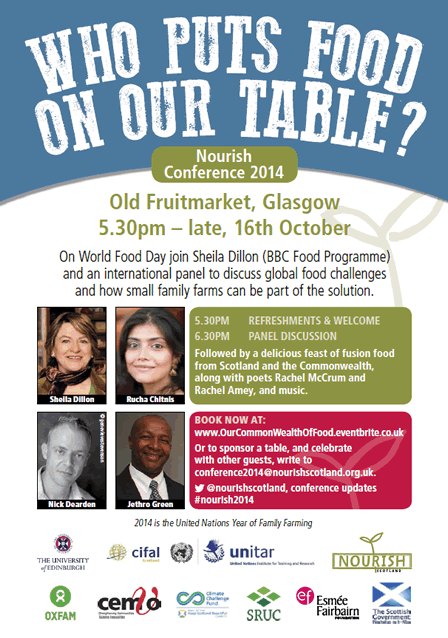
Who puts food on our table?
